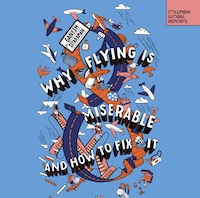Other economics
Come fly with me, even if you’d prefer not to
Would John Menadue’s Pearls and Irritations attract more funding if he offered donors frequent flyer points as a reward for their donations?
The thought wouldn’t have crossed Menadue’s mind, because unlike airlines, he does not have to buy loyalty.
On the ABC’s The Money Richard Aedy discusses loyalty programs with four experts: The cost of loyalty programs. From different perspectives they point out the cost of loyalty programs to consumers and to the economy generally.
From the airline’s perspective frequent flyer points make good sense, because they’re a low-cost way to hold customers. It’s cheaper to hold customers by offering frequent flyer points and therefore the occasional free flight, than it is to go out and try to recruit new customers. They’re particularly low cost to airlines, because the marginal cost of an extra bum on an otherwise vacant seat is next to nothing.
They are popular with consumers: Aedy gives a lead to the commentators when he points out that 15 million Australians are enrolled in Qantas frequent flyer programs and 11 million in Virgin’s. It’s a pity the experts don’t notice the futility revealed in these numbers, because the adult population is only 19 million, meaning millions of people are members of both airlines’ schemes – generally as a result from non-airline businesses partnering with airline schemes. That means they are taking on the characteristics of a negative-sum arms race for the airlines.

Avoiding those wretched points
Consumers seem to be oblivious to the poor deal in frequent flyer schemes. The points are like a currency, in which the bank issuing the currency has the power to change its value. Airlines can (and do) make it difficult for people to redeem points, and they use frequent flyer programs to indulge in elaborate price discrimination between customers. In all they’re clever ways to rob consumers of market power.
More opaque to frequent flyer members is the amount of personal information the airlines collect on each customer, including but not limited to travel information, particularly when that information is shared with partner companies. Such information is a treasure trove to companies, and can be onsold for lucrative returns. Quite apart from risks of identity theft, there is the possibility that such information in the hands of financial institutions can have a material effect on people’s credit ratings.
In this regard the government has conducted a review of the Privacy Act, which handed down its report in February last year. That report makes only one passing reference to loyalty schemes. So far, in its response last September, the government’s main response is an announcement that “The Government will progress consideration of reforms to Australia’s privacy framework under five key focus areas”, whatever “progress consideration” means that isn’t covered in the simple word “procrastinate”.
One of the commentators, Daniel Sciberras of the website Point Hacks has good advice for people to make the best of their loyalty programs. But it’s worth asking why people should have to spend their time engaged in a strategic battle with airlines in order to get a fair deal. In a perfectly competitive market there would be simple fare structures, with little price discrimination other than that which genuinely reflected cost differences. That’s how competitive markets are supposed to operate, isn’t it?

The only expert to raise the issue of how loyalty programs distort markets was Ganesh Sitarman of Vanderbilt University, author of Why flying is miserable and how to fix it. Loyalty programs are like a tax on all consumers, with no benefits for those who do not enrol in them. They add to the price of goods and services, and they cost consumer welfare. He didn’t elaborate on this point, but most economists point out that loyalty programs are a form of bundling: when I buy shoes or wine, I am choosing to buy shoes or wine: I am not choosing to buy an airplane trip.
It’s about choice, and markets work best when people can choose just what they want, and not have to pay for something else that’s bundled with their purchase. To those who have had lives of travel the thought of being offered free air travel is about as attractive as being offered a gift voucher for root canal therapy.
The government certainly should get a move-on with updating the Privacy Act, but rather than developing complicated provisions to protect members of loyalty schemes, it should simply ban them.
That’s not a radical idea: it’s perfectly in line with sound economic principles. Older Australians may remember earlier loyalty schemes, involving rewards for collecting box tops in exchange for a toy, or something similar. These schemes often carried the warning on the packet “not valid in South Australia’. That’s because in South Australia in 1904 Parliament passed the Trading Stamp Act to regulate the use of trading stamps or coupons, which specified that:
no person shall, under a penalty of not exceeding Twenty Pounds for each offence -
I Issue any trading stamp to any person ; or
II Give or deliver any money or goods on presentation of any trading stamp issued after the commencement of this Act.
The Act was weakened and eventually repealed when, in the late twentieth century, ideological zealots went on a spree of deregulation, forgetting the basic principle that some regulations are specifically intended to make markets work to the benefit of consumers.
It would be unfortunate if the present review of the ACCC doesn’t include a serious proposal to ban loyalty schemes, in the interest of promoting competition.
Is artificial intelligence coming for your job?
Probably not, but that doesn’t mean it won’t affect the way you work.
In an analysis of the economic impact of AI – AI will transform the global economy. Let’s make sure it benefits humanity – the IMF reminds us that AI is somewhat different to the earlier waves of technological innovation:
Historically, automation and information technology have tended to affect routine tasks, but one of the things that sets AI apart is its ability to impact high-skilled jobs.
It goes on to state:
As a result, advanced economies face greater risks from AI—but also more opportunities to leverage its benefits—compared with emerging market and developing economies.
The research upon which the IMF bases those general findings is a staff paper Gen-AI: Artificial intelligence and the future of work. It summarises the way AI will affect workers, with a clear message about how the income gains from AI are distributed:
Artificial Intelligence (AI) has the potential to reshape the global economy, especially in the realm of labor markets. Advanced economies will experience the benefits and pitfalls of AI sooner than emerging market and developing economies, largely due to their employment structure focused on cognitive-intensive roles. There are some consistent patterns concerning AI exposure, with women and college-educated individuals more exposed but also better poised to reap AI benefits, and older workers potentially less able to adapt to the new technology. Labor income inequality may increase if the complementarity between AI and high-income workers is strong, while capital returns will increase wealth inequality. However, if productivity gains are sufficiently large, income levels could surge for most workers. In this evolving landscape, advanced economies and more developed emerging markets need to focus on upgrading regulatory frameworks and supporting labor reallocation, while safeguarding those adversely affected. Emerging market and developing economies should prioritize developing digital infrastructure and digital skills.
That has clear implications for labour market and education policies.
The IMF refers to countries’ “AI readiness”. This is the Oxford Insights Government AI Readiness Index 2023, which assesses the extent to which countries’ governments are dealing with the regulation of AI and the extent to which they are prepared to use AI to improve the effectiveness and efficiency of public administration. In this regard they make specific (positive) mention of the 2023 Australian Government response to the House of Representatives Select Committee on Social Media and Online Safety Report.
In their ranking Australia is at position 12 out of 193 countries assessed, based on three “pillars” – government, technology sector, and data & infrastructure. We score well on the “government” pillar, but poorly on “technology” compared with other “developed” countries.